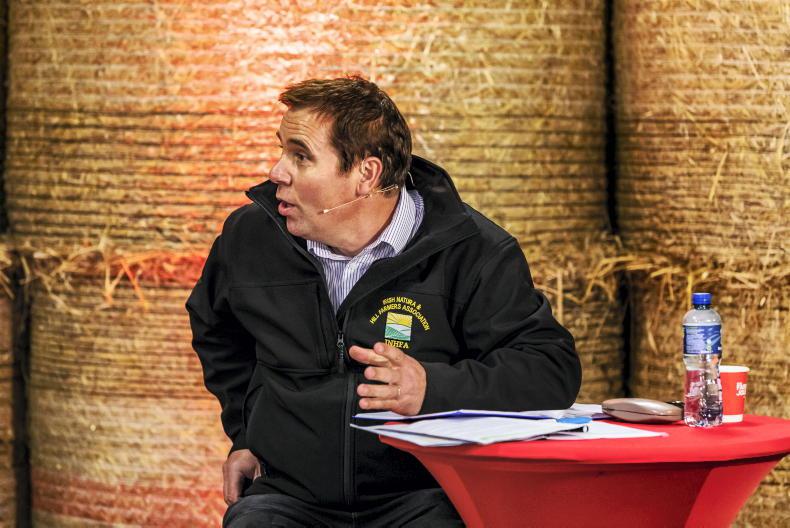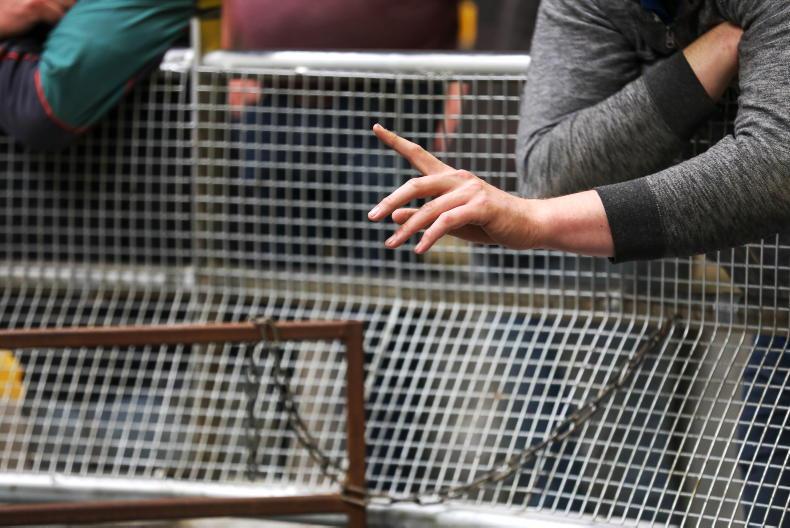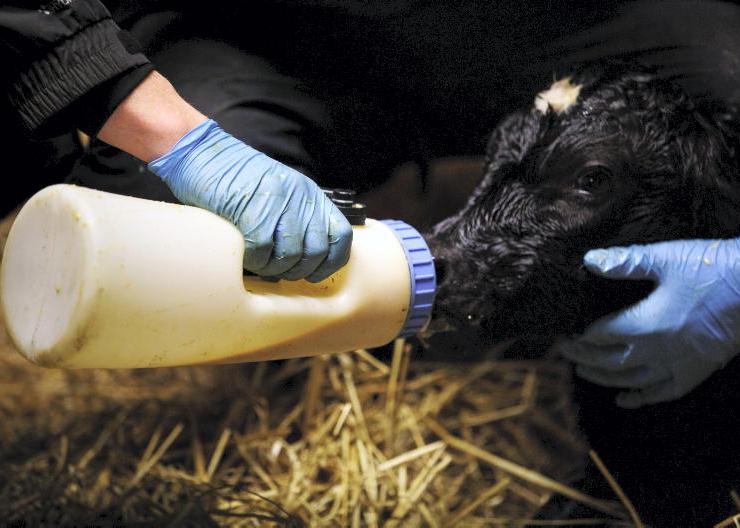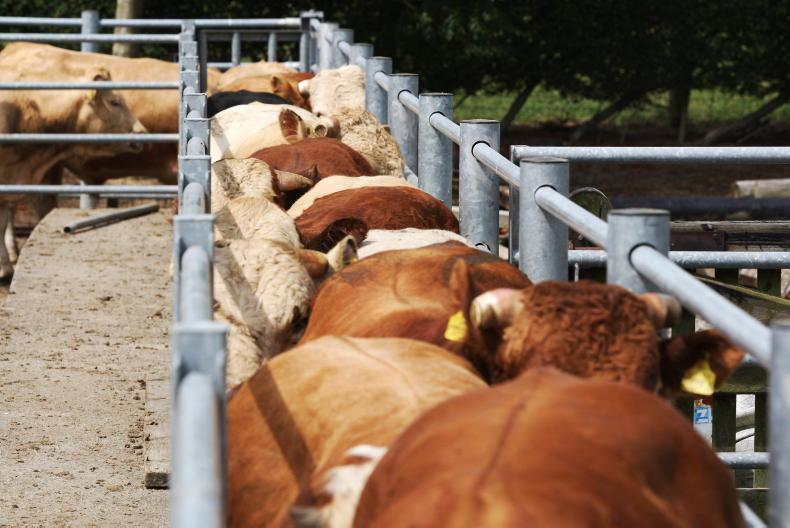Extensive suckler farmers will not accept a cut in beef cow numbers to solve an emissions problem which was caused by a small cohort of dairy farmers, the Irish Natura and Hill Farmers Association (INHFA) has insisted.
In a hard-hitting statement, the INHFA warned that the suckler herd must not be sacrificed in the drive to achieve agriculture’s 25% reduction in greenhouse gas (GHG) emissions.
The INHFA’s comments come as the Government prepares to announce details on how agriculture will meet its legally-binding emissions ceilings.
“Our suckler sector is not the problem when it comes to GHG emissions,” said INHFA president Vincent Roddy.
Pointing to the fact that the sector has seen an 18% reduction over the last 10 years, he said the real problem lay with a “small cohort” of highly stocked dairy farmers who were operating on “multiple platforms”.
Food Vision
Speaking on this for the first time since the association withdrew support for the Food Vision beef and sheep group, Roddy said that the INHFA had outlined on a number of occasions its opposition to proposals around a voluntary reduction/exit scheme and plans to reduce the age of first calving and slaughter age to 24 months.

INHFA president Vincent Roddy. \ Philip Doyle
He claimed these proposals would undermine the sector by imposing unrealistic targets and creating reputational damage to the marketing of naturally reared suckler beef.
“We are well aware of Government policy relating to our climate change targets and ongoing concerns around biodiversity loss and water quality.
"All of these are factors that must be considered in future plans around farming practices. In addition to these, we must also consider socio-economic factors and their impact across our communities,” Roddy said.
Targeted action
However, he warned that the problem with emissions growth must be addressed by the sector causing the difficulties.
“If there is an issue in a particular area or sector, then that is where the action must be targeted,” he maintained.
Rather than focusing on the suckler herd, Roddy said the authorities should concentrate on the “small cohort of farmers (predominantly dairy) that are operating multi-platform units with excessively high stocking rates”.
The INHFA president pointed out that when there were over-grazing problems on the hills 20 years ago, it was sheep farmers who carried the financial hit of destocking.
“When the Department of Agriculture introduced a 30% compulsory cull of sheep across all commonage hill sheep farms due to a breach of the European habitats directive, the problem was dealt with within the hill sheep sector,” the INHFA leader pointed out.
“Suckler farmers cannot be expected to pay for the sins of a small number,” Roddy insisted.
“It is time to address the issue on those farms that have a per-hectare bovine stocking density above what is legally allowed, through a planned approach over the next two years,” he said.
Read more
Climate Action Plan: what could be in it for beef farmers?
Cut of 10% to national herd 'kite flying and speculative' - ICSA
Extensive suckler farmers will not accept a cut in beef cow numbers to solve an emissions problem which was caused by a small cohort of dairy farmers, the Irish Natura and Hill Farmers Association (INHFA) has insisted.
In a hard-hitting statement, the INHFA warned that the suckler herd must not be sacrificed in the drive to achieve agriculture’s 25% reduction in greenhouse gas (GHG) emissions.
The INHFA’s comments come as the Government prepares to announce details on how agriculture will meet its legally-binding emissions ceilings.
“Our suckler sector is not the problem when it comes to GHG emissions,” said INHFA president Vincent Roddy.
Pointing to the fact that the sector has seen an 18% reduction over the last 10 years, he said the real problem lay with a “small cohort” of highly stocked dairy farmers who were operating on “multiple platforms”.
Food Vision
Speaking on this for the first time since the association withdrew support for the Food Vision beef and sheep group, Roddy said that the INHFA had outlined on a number of occasions its opposition to proposals around a voluntary reduction/exit scheme and plans to reduce the age of first calving and slaughter age to 24 months.

INHFA president Vincent Roddy. \ Philip Doyle
He claimed these proposals would undermine the sector by imposing unrealistic targets and creating reputational damage to the marketing of naturally reared suckler beef.
“We are well aware of Government policy relating to our climate change targets and ongoing concerns around biodiversity loss and water quality.
"All of these are factors that must be considered in future plans around farming practices. In addition to these, we must also consider socio-economic factors and their impact across our communities,” Roddy said.
Targeted action
However, he warned that the problem with emissions growth must be addressed by the sector causing the difficulties.
“If there is an issue in a particular area or sector, then that is where the action must be targeted,” he maintained.
Rather than focusing on the suckler herd, Roddy said the authorities should concentrate on the “small cohort of farmers (predominantly dairy) that are operating multi-platform units with excessively high stocking rates”.
The INHFA president pointed out that when there were over-grazing problems on the hills 20 years ago, it was sheep farmers who carried the financial hit of destocking.
“When the Department of Agriculture introduced a 30% compulsory cull of sheep across all commonage hill sheep farms due to a breach of the European habitats directive, the problem was dealt with within the hill sheep sector,” the INHFA leader pointed out.
“Suckler farmers cannot be expected to pay for the sins of a small number,” Roddy insisted.
“It is time to address the issue on those farms that have a per-hectare bovine stocking density above what is legally allowed, through a planned approach over the next two years,” he said.
Read more
Climate Action Plan: what could be in it for beef farmers?
Cut of 10% to national herd 'kite flying and speculative' - ICSA









SHARING OPTIONS